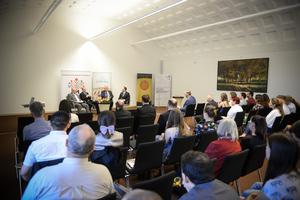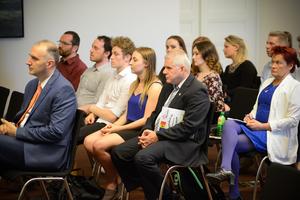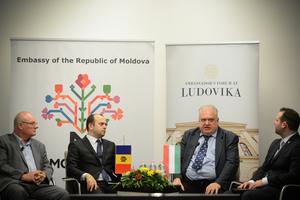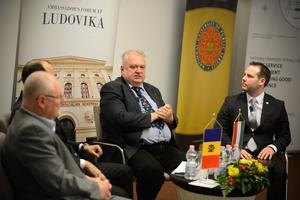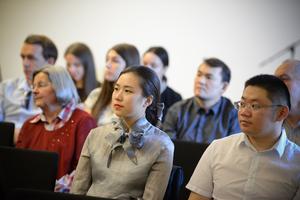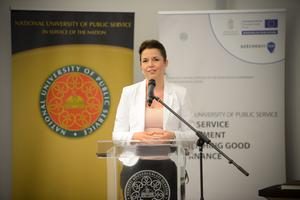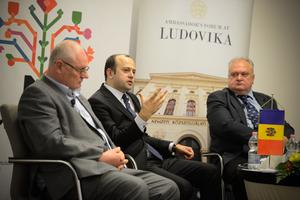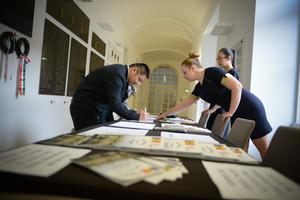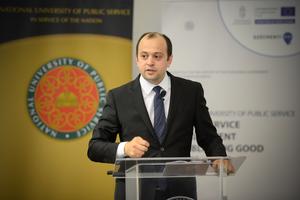H.E. Oleg Țulea, Ambassador Extraordinary and Plenipotentiary of the Republic of Moldova to Hungary was the special guest of the latest Ambassador’s Forum at Ludovika even series. In the Zrínyi Hall of the Ludovika Campus, His Excellency gave a presentation entitled “Republic of Moldova – Shaping the European Future”, and he talked about the history, economy of Moldova as well as the country’s relation with the EU.
The event was moderated by Pol. Maj. Dr. Bence Mészáros, acting Vice-Dean for Science and International Affairs of the Faculty of Law Enforcement. The guests and the audience were welcomed by Dr. habil. Boglárka Koller, Dean of the Faculty of International and European Studies.
Mr. Oleg Țulea acquired his university degree in political sciences in 2002 at the State University of
Moldova. Following his graduation, he worked as international secretary of the National Youth Council of Moldova until 2005. After that time, he had several mandates within the Parliament of Republic of Moldova, where he, among others, was member of the Committee for Human Rights. Since 2017 he is fulfilling the role of Vice-president of the Danube Commission. His current appointment as ambassador has started in 2016.
H.E. Oleg Țulea expressed his gratitude to present his country at this well-known event because as he said “wherever he goes, only a few people know about Moldova”, therefore the Ambassador’s Forum at Ludovika provides a good opportunity to promote his country. The ambassador hopes that beside the common past, Hungary and Moldova will have a common future as well within the European Union. “The United Kingdom voted to leave the EU. Moldova seeks the opposite, because the country is Europe’s geographical and cultural home, thus its future is also within the EU” - said the ambassador.
After the introduction, Mr. Țulea talked about the economical and political situation of Moldova. He said that the Transnistria dispute about the separation of the territory situated on the eastern bank of Dniester greatly impacts Moldova’s international and regional politics. In September 1990 Transnistrian separatists declared the independent state of Transnistria, however none of United Nations members recognize its sovereignty. Nowadays the conflict is still ongoing, but social and economic progress have been made in the past years. Moldova’s economy is mainly based on agriculture (around 40%), including horticulture, viticulture. In addition to agriculture, the automotive industry and the IT sector are also growing at a high pace due to the increasing number of companies operating in Moldova.
He highlighted that the European integration is a key point for the development of his country and he considers the Partnership and Cooperation Agreement as the tool to promote the development. In order to meet the European requirements, the country has adopted a three years Action Plan (National Action Plan for the Implementation of the EU-Moldova Association Agreement – NAPAA) to ensure the implementation of each article from the Association Agreement. According to the action plan, social areas, infrastructure, use of public funds and implementation of new technologies in agriculture are the key focus points of the country.
His Excellency then talked about the Hungarian-Moldovan diplomatic relations, highlighting that this year is the 25th anniversary of the two countries’ relations. "I am pleased that when I talk to colleagues working at different institutions, everyone appreciates Moldovan-Hungarian relations and I hope that it will remain the same in the future” - he said. Finally, he also considers it important that Hungary is supporting Moldova’s EU integration.
Following the presentation of the ambassador, a roundtable discussion took place where Pol. Maj. Dr. Bence Mészáros facilitated the conversation. One of the invited experts was Mr. János Barabás T., senior analyst of the Institute for Foreign Affairs and Trade whose main research fields are Romania, Moldova, neighbourhood policies, and also information warfare and security policy. The other expert of the event was Eng. Major General (Ret.) Dr. Ferenc Bánfi, former director of The European Union Agency for Law Enforcement Training (CEPOL). He was also head of the European Union Border Assistance Mission to Moldova and Ukraine (EUBAM), thus he has deep knowledge about the region.
During the discussion, the experts talked about the political status of Transnistria and its impact on geopolitics and defence policy, including the possibility of Moldova’s NATO membership. The ambassador added that based on the latest public surveys, 25% of the population supports the NATO membership.
After the roundtable discussion, the audience asked questions from the guests which were also related to the geopolitical situation of Moldova, fake news as well as disinformation.
